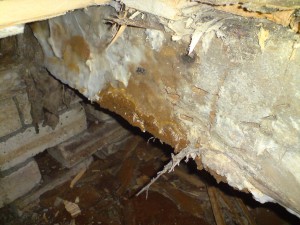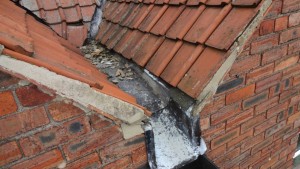By Simon Gompertz Personal finance correspondent, BBC News

More families are shunning full building surveys so they can raise enough cash to buy a home. The Royal Institution of Chartered Surveyors (RICS) warns that they risk huge repair costs after finding nasty surprises later. One in five of those who did not bother with a survey later uncovered faults, according to research involving more than 1,000 buyers conducted by ComRes for RICS. Remedial work cost £5,750 on average. RICS said 17% of new owners ended up paying more than £12,000 to make their homes habitable.
Kelly Case, from Romford in Essex, told BBC News how she had been left with tens of thousands of pounds of work after not having a survey done.
“We’ve spent around £35,000 already,” she says, “And it’s ongoing.” Her mock Tudor house looked sound and seemed to be a bargain. But the dream dwelling has turned into a nightmare. “It’s estimated that we’ll have to spend another £50,000 to £60,000 to get to a position where we’re happy and it’s structurally safe to live in,” she explains. “I don’t know where we are going to find the money to do that.”
The central heating pipes were leaking at the joints and had to be replaced. The electrics were dangerous and the downstairs floors had wet rot. On the upper floor there was damp and a set of stairs which contravened building regulations.
Drive-by valuations
A full building survey costs as much as £1,000. Even the briefer homebuyer report, at up to £400, should pick up serious problems. But like many buyers, Kelly Case relied on only her mortgage provider’s valuation. Estate agents say it is a growing problem, the result of family budgets coming under pressure. Valuations do not include a full inspection. In fact, some are done from a desk miles away or after a drive past the property.

A third of the sample of buyers questioned by ComRes had failed to commission a survey. Of those, nearly 20% found faults in their new property. Some are suspicious of surveyors, believing that they can hide behind get-out clauses and disclaimers if they fail to detect problems. Others feel forced to scrimp on the cost of a survey because of the pressure to save for a deposit and cover other moving costs.
“They may not want to spend £1,000 on the survey but they’re prepared to spend £200,000 or £300,000 on the property,” complains Graham Ellis of Greenhouse Surveyors in Lancashire. “That £1,000 could tell you an awful lot about the house and it could give you the opportunity to renegotiate the purchase price.”
The government is resorting to extreme measures to try to revive the housing market. The Bank of England is channelling cheap money to banks to get mortgage interest rates reduced and the chancellor has promised special guarantees to bring homes within the financial reach of more buyers. But the last thing families need if they are financially stretched is a barrage of bills for unforeseen repairs.
RICS says neglecting to commission a survey creates a “home-buying time bomb”. The new owners could be stuck with a property which they cannot afford to put right and which no one else wants to buy.
Source: By Simon Gompertz Personal finance correspondent, BBC News
What Alan Holmes Chartered Building Surveyor says:
‘The Homeowners Alliance reports that only 20% of home purchasers have a professional survey (over and above the mortgage valuation) carried out before purchase. Hundreds of thousands of homebuyers will move over the next year without bothering to find out if their next property is in good condition. This is because most buyers do not know about or are not willing to pay for a survey. Most believe that their mortgage lender’s standard valuation is sufficient, although it says nothing about the building’s state of repair. And of those who do commission an independent survey to ensure there are no serious faults with their future home, the majority opt for a cheaper type that can miss crucial details.
Experts say the problem could be compounded if a push to introduce Scottish-style ‘home reports’ to England and Wales is successful. Scottish sellers must pay for one when they market their home.
But they have been recommended for the wider UK property market in an independent report, commissioned 2014 by the Royal Institution of Chartered Surveyors and authored by former MP and chair of the UK Valuation Commission, Dr Oonagh McDonald.’
More info:
Please refer to the Which-RICS-Survey.
or
Our explanation of different property survey types